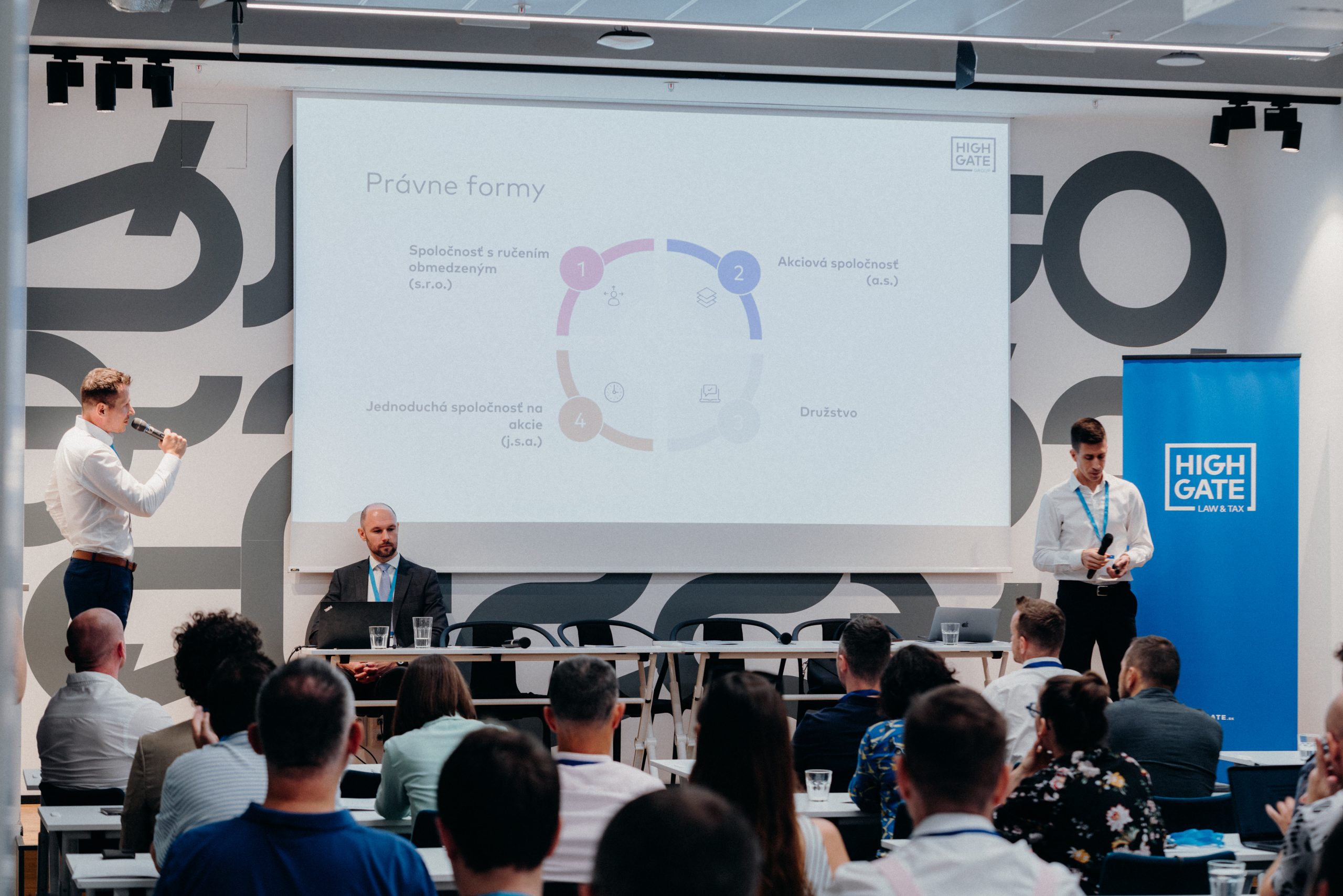
The business community has enthusiastically embraced the recently approved amendment to the Income Tax Act (“ITA“), which aims to not tax/tax acquired shares in companies for the so-called. ESOPists (the “ESOP Amendment“).
So let us break down what was actually adopted:
In addition to income exempt from tax under Section 9, income provided as a benefit in kind acquired by an employee in the form of employee shares valued at their nominal value or a business share in a limited liability company valued at the value of the contribution determined in accordance with Section 25a attributable to the employee in connection with the performance of a dependent activity carried out for the employer whose shares or business share is so acquired shall also be exempt from tax, if:
In the conditions of the Slovak business world it can be simplified as follows: the acquisition of shares from the employer for whom the ESOPist works is exempt from tax, if the employer did not pay dividends in the period from its establishment until the end of the year preceding the year in which it first paid them. The same applies to self-employed persons (“self-employed persons“).

Unfortunately, there is a relatively clear split between the ambition of the ESOP amendment and the ability of its language to bring about a general consensus on its content. While it is true that a legal text (i.e. an ESOP amendment) must enjoy a certain degree of linguistic openness, given its adoption in advance for an indeterminate number of cases, the ESOP amendment displays the basal signs of semantic and, to some extent, linguistic chaos.
Interpretation 1: If I were to settle for its mechanical interpretation, any such ESOP is exempt from tax. Indeed, every single employer did not pay dividends between the time of its inception and the time it first paid them. Such an interpretation, however, is plainly inconsistent with the authentic interpretation. The legislature did not mean to say this(see the amendment in the NRSR). Nor does the Treasury Department interpret it that way in this information (“Available Interpretation“).
Interpretation 2: It appears that both the Financial Administration and the Ministry of Finance of the Slovak Republic interpret the ESOP amendment in a relatively non-standard way, not only in terms of the possible consequences that will arise in practice, but also in terms of creating a new precedent. Namely, if an ESOPist’s interest in a company is acquired in January 2024 and a profit (of any kind) is paid out in December 2024, the employer (or self-employed person) must “tax” the January acquisition of the interest after 11-12 months. Thus, the non-cash income may be non-taxable income for a period of time and at some point in the future it will turn into taxable income. Interesting design precedent.
However, such a view has a statutory basis in grammatical interpretation, which ties the phrase “up to…” to the exemption of income from the shares received and not to the period of non-payment of dividends. A peculiar choice of syntax for such an intentional interpretation. At the same time, however, such an interpretation also has ill-conceived application consequences:
Interpretation 3: If we accept the possibility of applying Interpretation 2, we must also accept an interpretation that says that the acquisition of a share at a price below the market price is exempt from tax, but only until the company has paid the first dividends (i.e. there is no restriction to just that one calendar year). Thus, if the company pays dividends in 2050, the ESOPist/company would have to tax the non-cash income additionally. While this sounds absurd, what prevents the state from not applying such an interpretation? Where does the ESOP amendment limit this retroactive taxation to only situations that occur in the same calendar year? Relying on a reasonable (possibly axiological) interpretation of legal norms may not be entirely reasonable in Slovak circumstances. We have seen this in the case of Andrej Kiska and his tax case. By the way, if you are interested in this topic, I gave a quick tax-law excursus on it a while ago here(Did Andrej Kiska really commit a crime as a managing director of KTAG?).
Interpretation 4: What is intended to be exempt under the ESOP amendment is “employee action.” This implies that the exemption applies only to situations where the ESOPist receives such a share for free. In fact, the ESOP amendment does not speak of exempting in-kind consideration acquired on account of the difference between the fair value of the share and its acquisition value paid by the employee. Is it sufficient to use the a maiori ad minus (greater to lesser) argument to exempt the value of the non-cash income?
Interpretation 5: The ESOP amendment does not give a firm answer even on the amount of income to be exempted from tax. The available interpretations, though, try to interpret the exemption to exempt the entire income (i.e., the fair value of the shares) and for the purpose of valuing the shares so acquired with the ESOPist, the face value of the shares is to be used. And such an interpretation is also e-ratione legis.
But the problem is that (i) such an interpretation creates a manifestly inadequate structural incoherence in the ITA and (ii) the reference in the ESOP amendment to section 25a and only for SRO interests does not quite make sense. After all, a non-entrepreneurial natural person values the acquired financial assets according to sec. 5 and not under section 25a of the ITA. Such an interpretation of the e-ratione legis thus constitutes a “pandora’s box” to the “illegibility” of the ITA. Indeed, if we were to ascribe correctness to the Available Interpretation, it would mean that for any sale of financial assets, we would have to read every single provision of the ITA and look for special adjustments to the valuation of financial assets in them. And this is in view of the wording of Art. 5, lit. a) and § 25a of the ITA is systematic nonsense. Moreover, this interpretation also contradicts the theory of taxation, which I wrote about briefly in a previous newsletter).
Thus, if the sentence structure of the ESOP amendment is viewed through the prism of the systematic method of interpretation and the theory of taxation, only the face value of the shares should be exempt from tax, not their fair value (“in-kind consideration acquired by an employee in the form of employee shares valued at their nominal value” – valued is linked to the shares and determines the amount of the exempt non-cash consideration). And in other similar situations, the difference between the fair value and the value so appraised must, again in the view of the Internal Revenue Service, be taxed and thus “taxable” as noncash income.

Be that as it may, it appears (with some degree of exaggeration) that, if the ESOP amendment had had the following operative language, “The exemption is the acquisition of shares from the employer if such exemption is equitable,” it would probably have been the same in terms of the quality of the legal standard. Given the more current lament over Slovakia’s unpredictable status as a state governed by the rule of law, this is not an ideal legislative environment.
In addition to the interpretative problems, the ESOP amendment has several other shortcomings:
These structures are absolutely standard and are based in part on the needs of corporate law (e.g. SROs cannot flexibly own their shares or the elimination of a high number of shareholders or a high value of the minimum contribution is necessary), the preferences of contractors as well as the requirements of investors. These needs are relatively common knowledge, so it is not clear to me why they are not reflected in the ESOP amendment.
The ESOP amendment once again fully exposed the quality and (in)competence of the standard-setting process in Slovakia. As with the crypto amendment, which for example wanted to introduce non-taxation of crypto asset exchanges (I have discussed this more in this video podcast or written in more detail here), the good intention of the ESOP amendment was not translated into appropriate language. And this significantly undermines not only the rule of law, but also the efficiency of doing business in Slovakia.
The interpretation of the ESOP amendment is therefore ambiguous and its application unpredictable. We are thus still forced to look for alternative structures and solutions for our clients than ESOP intra legem not to tax. And worse, in practice, the alternative is even situations where companies give no imperative weight to the taxation of ESOPs. In either case, it is the business environment that suffers in the long run. Namely, through unnecessarily higher costs to advisors (us) and/or the existence of an unfair, arbitrary and non-transparent environment.
If you have any questions, feel free to contact me. For more of this information, subscribe to our newsletter.
If you are interested in this topic, please do not hesitate to contact us.
Law & Tax
Tomas Demo
tomas.demo@highgate.sk
Accounting
Peter Šopinec
peter.sopinec@highgate.sk
Crypto
Peter Varga
peter.varga@highgate.sk